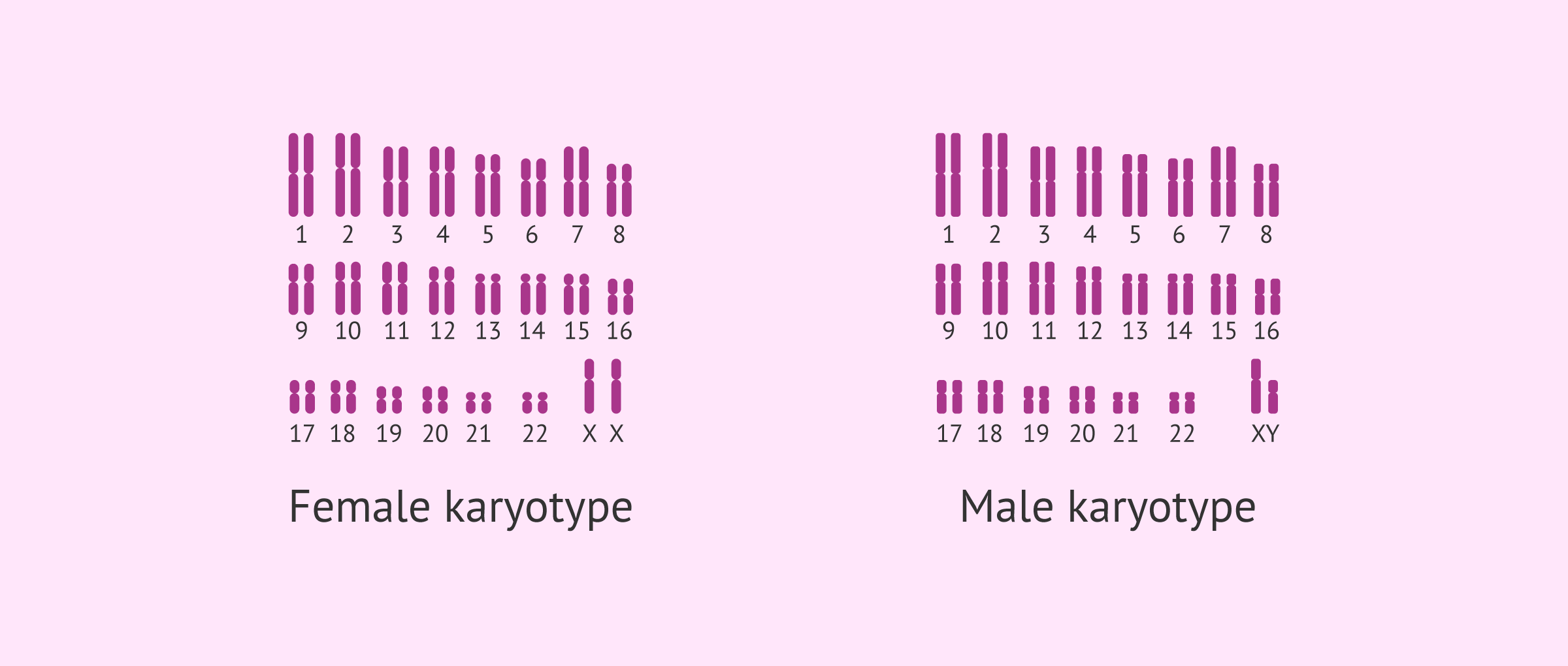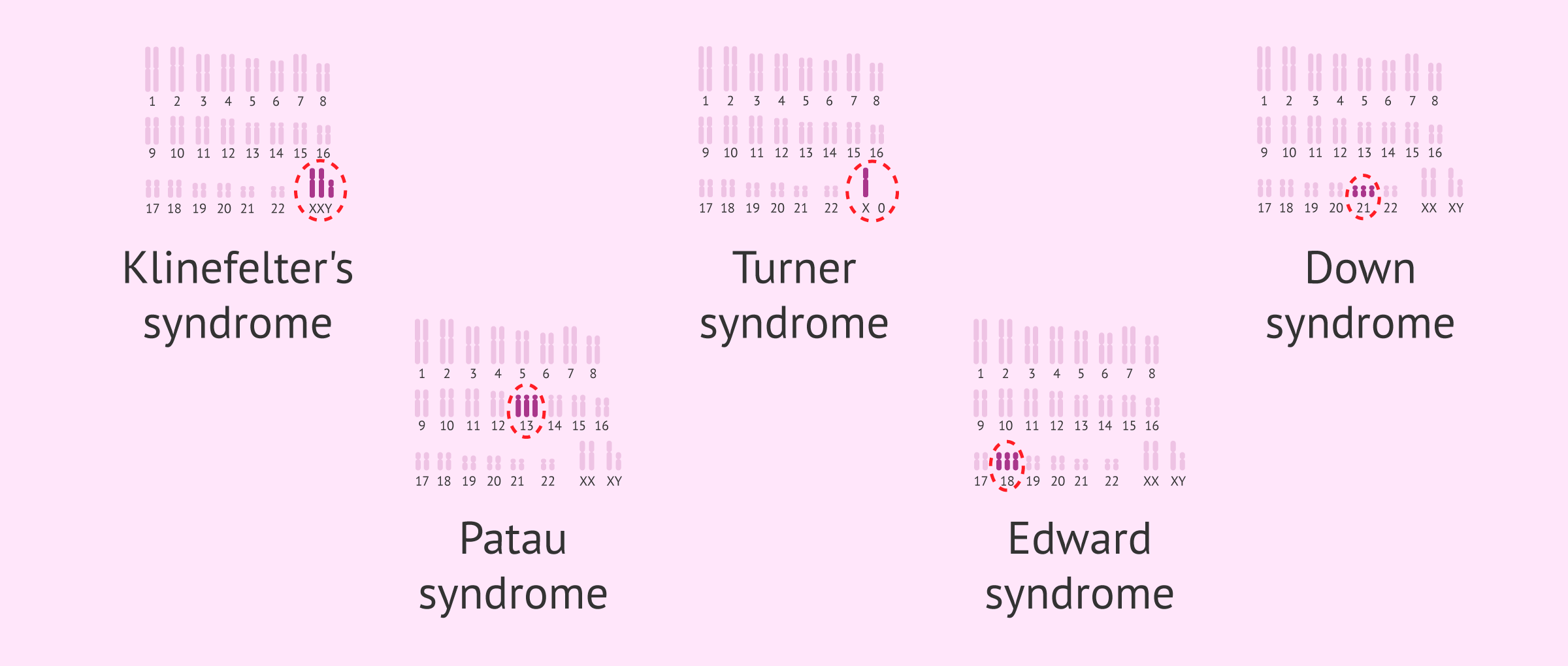The karyotype is the set of chromosomes of an individual ordered according to their morphology and size. Therefore, its study allows the detection of numerical and structural anomalies in chromosomes.
The study of the karyotype is a fundamental test for all those patients who resort to a fertility center because they are unable to achieve pregnancy in a natural way. It is, therefore, a basic test in the study of female and male fertility.
To obtain a person's karyotype it is necessary to perform a blood draw. From it, lymphocytes are cultured in the laboratory until the chromosomes are maximally compacted and observed under the microscope.
Provided below is an index with the 7 points we are going to expand on in this article.
Karyotype
The human being has 46 chromosomes (23 pairs) and they contain all the genetic information of an individual. For this reason, the karyotype is nothing more than the way in which the information is organized and arranged. Of the 23 pairs of chromosomes in humans, 22 pairs belong to autosomes.
The 23rd pair corresponds to the sex chromosomes, which in the case of the female will be XX and in the male XY. Therefore, normal chromosomal endowment in females would be described as 46, XX and in males as 46, XY.
However, a person's karyotype may undergo slight variations. For example, people with Down syndrome contain an extra chromosome 21, their chromosomal endowment being 47 instead of 46.
What does karyotyping detect?
Karyotyping is a fundamental test in the study of fertility, since it allows the detection of chromosomal abnormalities both numerically and structurally. Numerical chromosomal alterations include, for example:
- Klinefelter's syndrome: there is an extra X chromosome, being its karyotype 47, XXY.
- Turner syndrome: when one X chromosome is missing (45, X0).
- Down syndrome: trisomy of chromosome 21 (47, XX, +21 or 47, XY, +21).
- Patau syndrome: trisomy of chromosome 13 (47, XX, +13 or 47, XY, +13).
- Edwards' syndrome: trisomy of chromosome 18 (47, XX, +18 or 47, XY, +18).
In relation to structural alterations in chromosomes, it is possible to identify deletions, inversions, translocations, etc. through the study of the karyotype. On numerous occasions, these anomalies in chromosome structure are the cause of recurrent miscarriages and/or ovarian failure, as well as alterations in seminal quality in the case of the male.
Karyotyping and fertility treatments
As indicated above, the study of the karyotype provides information about the chromosomes. However, this genetic test cannot identify alterations in genes, i.e. monogenic diseases.
When the result of the karyotype is altered, it is possible to resort to assisted reproduction techniques to achieve a healthy baby in case. In this case, it would be advisable to perform in vitro fertilization (IVF) with preimplantation genetic diagnosis (PGD).
In this way, the fertilization of the egg and sperm would take place in the laboratory and the embryos obtained would be genetically analyzed in order to transfer those that are genetically healthy.
Embryos with any chromosomal abnormality would be discarded. In the case of more serious genetic alterations, the alternative would be to opt for gamete donation.
FAQs from users
When is it necessary to perform a karyotype?
The karyotype is indicated in all couples who attend an assisted reproduction consultation due to infertility problems. However, there are clinics that only send it in the following cases:
- Azoospermia
- Severe oligozoospermia
- Repeated implantation failures
- Repeat abortions

How is human karyotyping done?
The human karyotype is the set of chromosomes in each of a person's cells. The normal karyotype would be composed of 46 chromosomes, that is, 23 pairs of chromosomes.
In order to perform a karyotype study, it is necessary to carry out a blood extraction. This blood sample is sent to the laboratory where a lymphocyte culture is performed. In this way, the chromosomes are compacted and can be visualized under the microscope. Previously, the chromosomes are stained in order to distinguish the bands they contain, the shape and size, thus being able to differentiate the different chromosomes.
Is karyotyping performed on gamete donors?
Yes, the karyotype study is a fundamental test before starting the gamete donation program. If gamete donor candidates have any chromosomal alteration, they would not be accepted in the donation program.
Suggested for you
In addition to karyotyping, it is important to perform other fertility tests in both men and women. For this reason, we recommend you read this article: What is a fertility test? What fertility tests are available?
Depending on the results of each of the fertility tests, the specialists will be in charge of indicating the best treatment to achieve the desired pregnancy. If you are interested in the reproductive options available, you can click on this link: Assisted reproduction techniques: differences and complexity.
We make a great effort to provide you with the highest quality information.
🙏 Please share this article if you liked it. 💜💜 You help us continue!
References
Ahmad Majzoub, Mohamed Arafa, Christopher Starks, Haitham Elbardisi, Sami Al Said, Edmund Sabanegh. 46 XX karyotype during male fertility evaluation; case series and literature review. Asian J Androl. 2017 Mar-Apr;19(2):168-172. doi: 10.4103/1008-682X.181224 (View)
Alan D Rogol. Sex chromosome aneuploidies and fertility: 47,XXY, 47,XYY, 47,XXX and 45,X/47,XXX Endocr Connect. 2023 Aug 1;12(9):e220440. doi: 10.1530/EC-22-0440 (View)
Anders Juul, Claus H Gravholt, Michel De Vos, Ekaterina Koledova, Martine Cools. Individuals with numerical and structural variations of sex chromosomes: interdisciplinary management with focus on fertility potential. Front Endocrinol (Lausanne). 2023 May 5:14:1160884 (View)
Pedro Acién, Maribel Acién. Disorders of Sex Development: Classification, Review, and Impact on Fertility. J Clin Med. 2020 Nov 4;9(11):3555. doi: 10.3390/jcm9113555 (View)
Roman Gaebelein, Sarah V Schiessl, Birgit Samans, Jacqueline Batley, Annaliese S Mason. Inherited allelic variants and novel karyotype changes influence fertility and genome stability in Brassica allohexaploids. New Phytol. 2019 Jul;223(2):965-978. doi: 10.1111/nph.15804. Epub 2019 Apr 24 (View)
FAQs from users: 'When is it necessary to perform a karyotype?', 'How is human karyotyping done?' and 'Is karyotyping performed on gamete donors?'.



